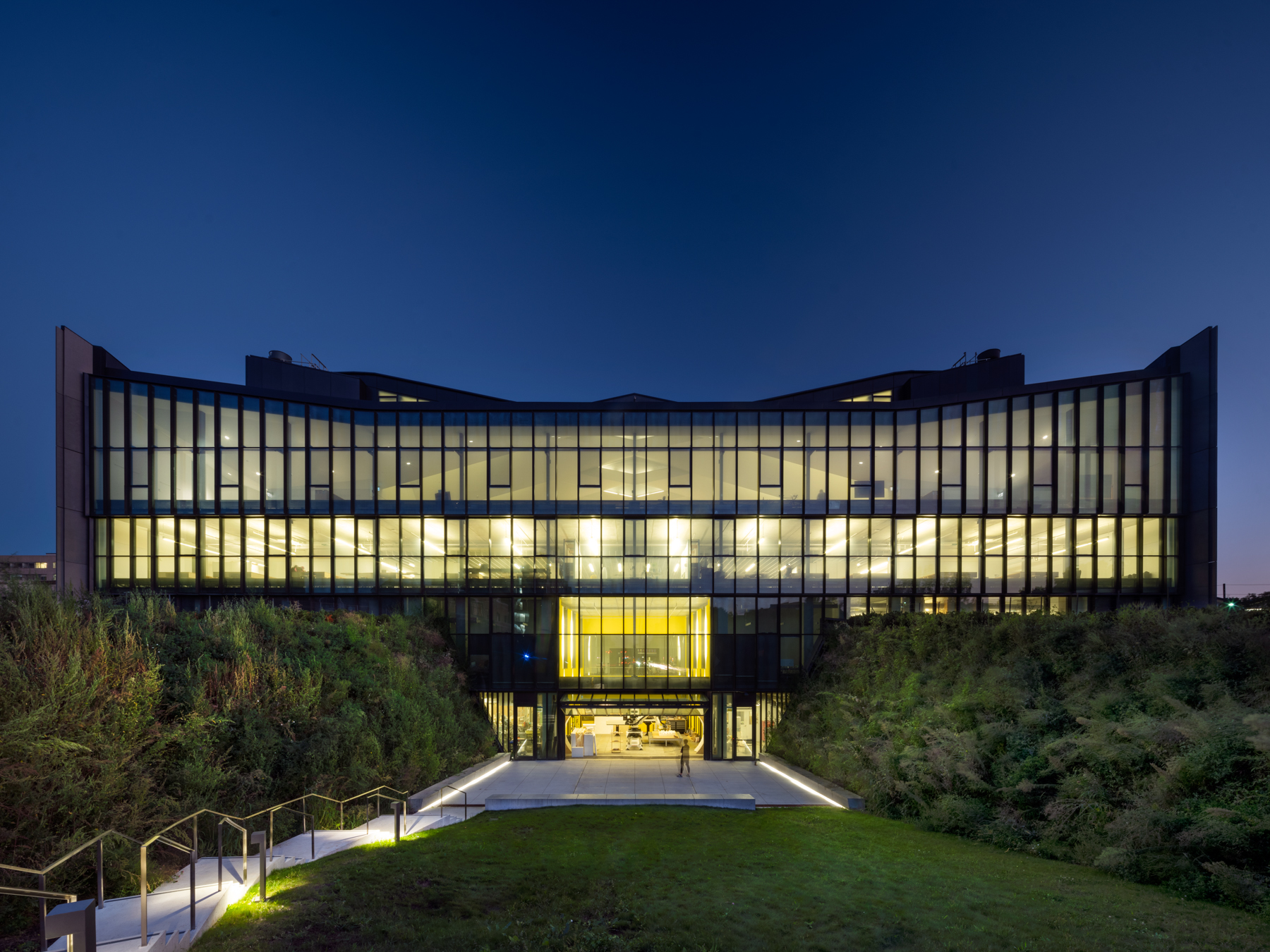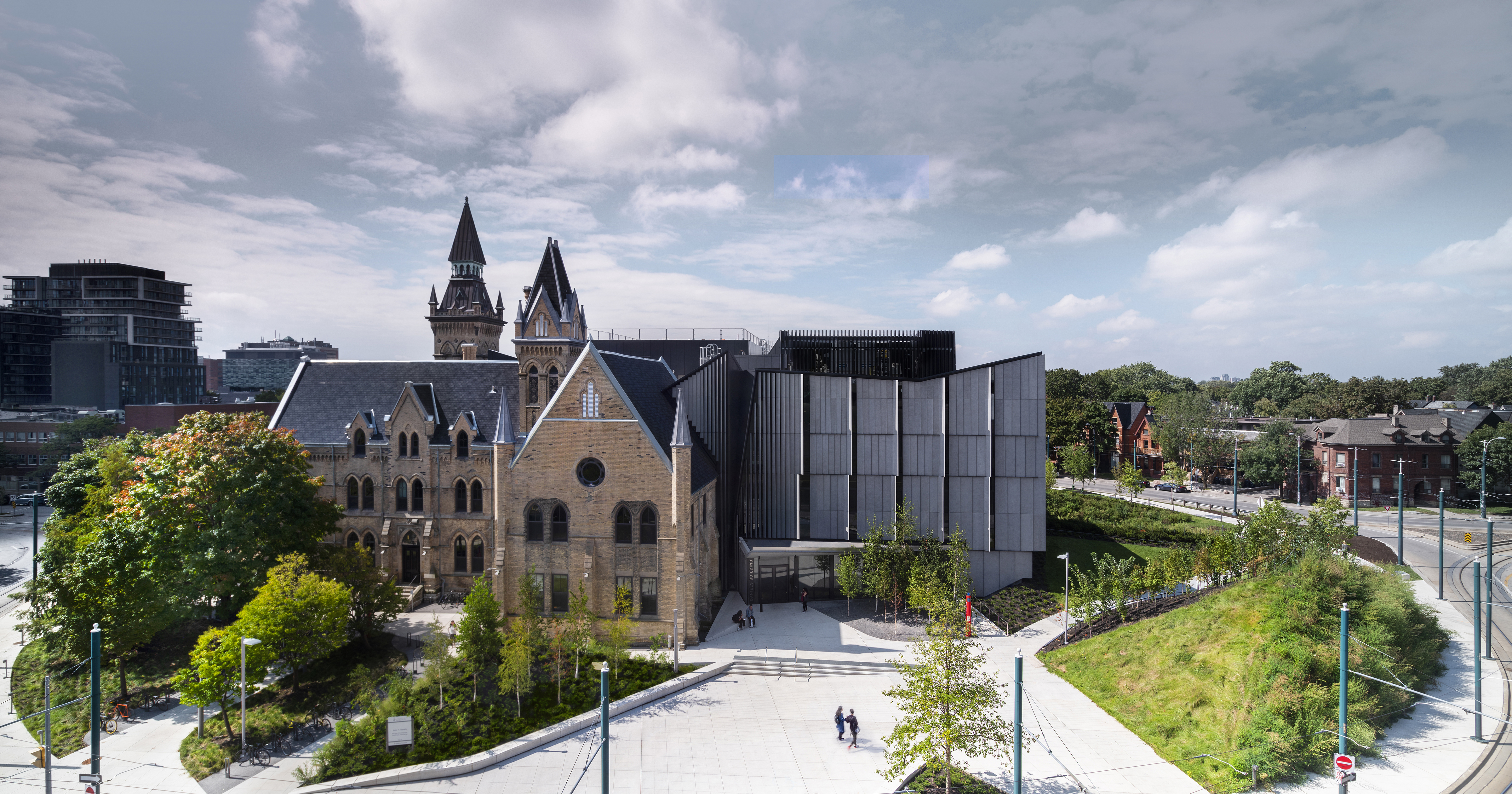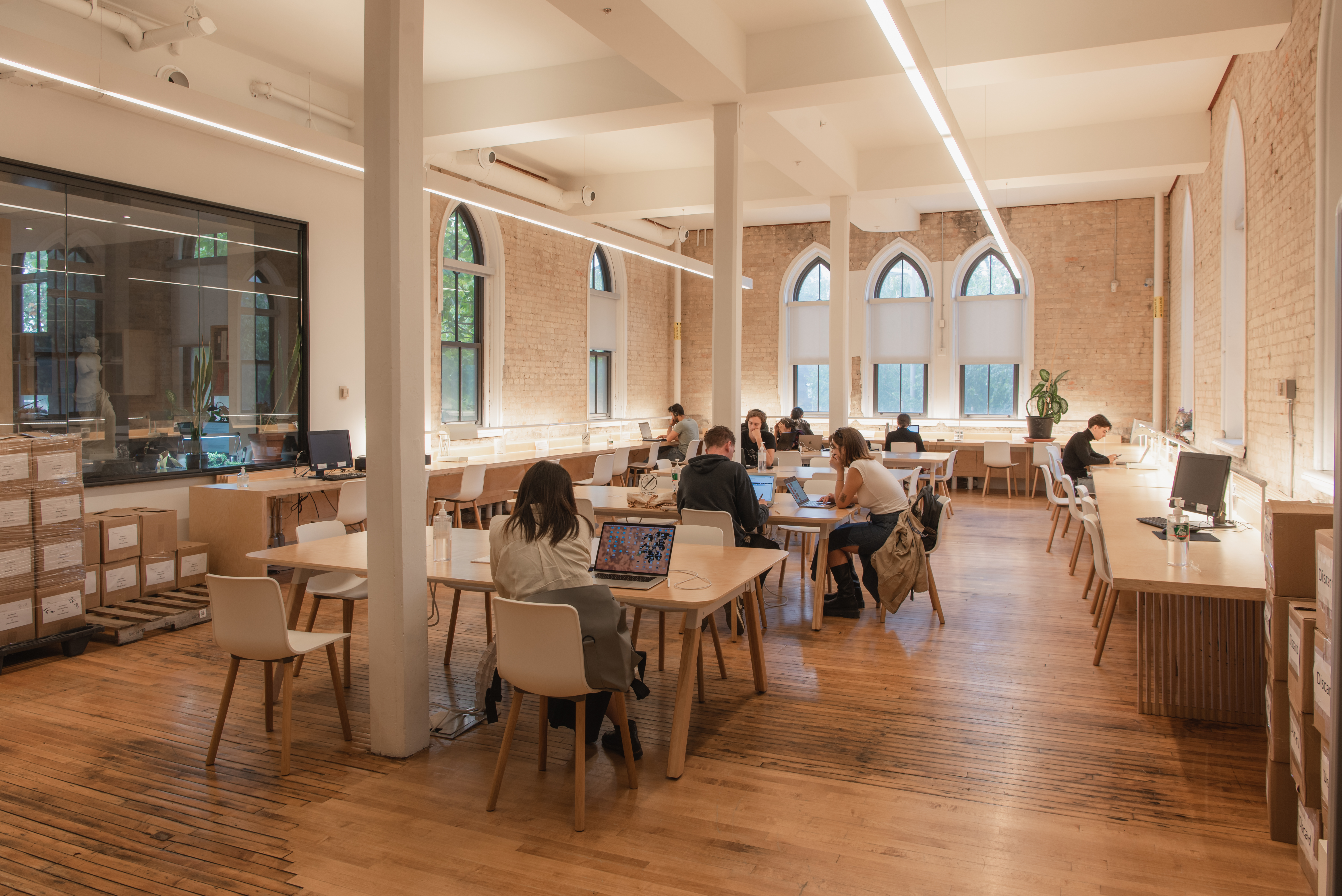PhD in Architecture, Landscape, and Design

Information session
Watch the live information session recording with Professor Claire Zimmerman, Director of the PhD in Architecture, Landscape, and Design
Description
The Doctor of Philosophy in Architecture, Landscape, and Design (ALD PhD) at the Daniels Faculty is a rigorous interdisciplinary program that trains students to pursue advanced research across a spectrum of built environmental practices.
Through our highly adaptable curriculum—one that is unlike other PhD programs in architecture—the program enables students to pursue study independently and to share their research with the Daniels community at every stage. ALD PhD students explore methodologies across our disciplines, ranging from theoretical to applied research in design, history theory, building science, and visual studies.
We help students work across disciplines, to familiarize themselves with broad knowledge areas that will equip them to address contemporary scholarly, political, economic, and policy problems. Students may elect to advance academic scholarship while also creating new models of research-based practice that can be implemented in real world settings. We encourage graduates to transcend current disciplinary boundaries and position them to engage and lead emerging discussions outside and between specific design disciplines.
ALD PhD students at the Daniels Faculty explore methodologies across our disciplines, ranging from theoretical to applied research in design, history theory, building science, and visual studies. Whether focusing on the transnational histories of the Chinese garden, researching the neglected prehistory of the environmental movement, monitoring operations in digital architectural production, or tracking proprioception and daylighting, the engagements of our students range across the built environment at different scales and in different registers. The increasing complexity of architecture, landscape architecture, cities, and exurban settlements warrant creative design, critical thinking, and ethical action guided by advanced research. The challenges facing constructed environments in the 21st century push us beyond existing disciplinary lines to seek synergies among our fields—building science and engineering, computation and fabrication, health and society, history and theory, technology and environment—and to develop these synergies in tandem with fields like artificial intelligence, building performance evaluation, climate justice, community-based knowledge practice, digital design processes, forensic architecture, formalism, gender studies, heritage conservation, Indigenous studies, landscape studies, robotics in design, sustainability, visual studies, and many others.
The Doctor of Philosophy in Architecture, Landscape, and Design goes beyond the traditional divide between applied and theoretical knowledge, bringing the two together to develop rigorous yet activist knowledge practices commensurate with present needs. The ALD PhD program is intended for students with aspirations to become active researchers and/or educators, work in government and industry, conduct research within design firms, or become community activists dedicated to meaningful social change through built environmental action.

University of Toronto
In addition to our core PhD faculty, affiliated faculty with expertise in design problems from multiple disciplinary perspectives are directly involved in the life of the program. These faculty members are primarily housed in schools and departments across the University of Toronto, yet they also supervise ALD PhD students.
Students in the PhD program have opportunities to work with a wide range of institutions within and beyond the University: the Jackman Humanities Institute, the Global Cities Institute, the Munk School of Global Affairs, the School of the Environment, the Department of Geography and Planning, the School of Engineering, the Art Museum at the University of Toronto, the Canadian Centre for Architecture, the Royal Ontario Museum, the Art Gallery of Ontario, and the rich array of universities in and near Toronto.
Requirements
Required coursework includes a colloquium and a methods course in the first year. The second year is primarily dedicated to a practicum and dissertation proposal preparation, which commences in the third year. Our funding package covers students for four years of full-time study and assists those who need additional years to find external grants to fund their program of study.
The PhD in Architecture, Landscape & Design requirements include:
- Coursework (6.0 FCE, including 4.0 FCE in electives and four required PhD courses: ALD4030H: Doctoral Research Colloquium; ALD4040H: Theories and Methods; ALD4050H: Research Practicum; and ALD4060H: Preparation for Thesis)
- A two-part comprehensive exam testing breadth after 18 months and depth after 24 months
- Successful defense of a dissertation proposal
- Written dissertation
- Successful doctoral final oral examination
(Note: Additional courses or examination requirements may be necessary based upon faculty advisement.)
The program includes the following minimum required courses:
- (ALD 4030H 0.5 FCE) Doctoral Research Colloquium: Research in the fields of architecture, landscape architecture, urbanism, and design takes many forms and produces distinct areas of inquiry. This course brings together PhD students and students from the post-professional programs to encourage an intradisciplinary discussion of their unique research methods, and to support cohort building and a strong sense of community amongst students. The course will be team taught by thesis supervisors in the proposed PhD program.
- (ALD 4040H 0.5 FCE) Theories and Methods: In this course, PhD students will explore theories and methods that have guided different disciplines in order to focus more narrowly on the unique approaches of their chosen field of study.
The program also requires participation in two doctoral research colloquia:
- (ALD 4050H) Research Practicum: The practicum generally results in a long research paper. This requirement enables students to conduct independent research on a limited scale at the level of quality expected for a dissertation, although the resulting paper is much shorter in length. The research should be comparable to that which results in a publishable article. Based on a consultation with their advisor, the practicum may take on one of several forms, including but not limited to: i. A self-contained paper or empirical study of publishable quality that may or may not be a component of dissertation work.
ii. The development of a theoretical model upon which the dissertation is to be based.
iii. A proposal for pilot research in the student’s dissertation area that includes a focused literature review, research design, and protocol.
- (ALD 4060H) Preparation for Thesis: Independent thesis research in preparation for the general exams or dissertation proposal.
Elective Requirements
The remaining required minimum 3.0 FCE (six half-credit courses) are electives to be selected from advanced (3XXX series) graduate level courses offered at the Daniels or advanced graduate courses in cognate disciplines across the University of Toronto pending the approval of the Faculty. The student’s program of study will be determined in consultation with his or her supervisory committee and approved by the committee.
Curriculum
The required courses listed above ground a student’s core experience in the doctoral program and provide the student cohort with a common learning experience. This pedagogical approach will expose students to methods of research and analysis that will provide intersections between the cultural-historical and the technical-professional knowledge that are not afforded in other academic disciplines with claims upon the built environment.
Electives—whether taken within the Daniels Faculty or in other University of Toronto programs—must be selected in consultation with each student’s assigned faculty advisor. Depending upon a student’s desired area of specialization, faculty advisors may require study in foreign languages, technical skills, historical periods, or research methods.
All graduate students at the University of Toronto must complete all of their course requirements at the graduate level.
Term 1
ALD 4030H: Doctoral Research Colloquium
Elective
Elective
Term 2
ALD 4040H: Theories and Methods
Elective
Elective
Term 3
Comprehensive Examinations
Term 4
ALD 4050H: Research Practicum
Elective
Elective
Term 5
Comprehensive Examinations
Elective
Elective
Term 6
ALD 4060H: Preparation for Thesis
Term 7+
Thesis
Dissertation Proposal
Dissertation Proposal
Each student’s dissertation proposal should outline the main argument, rationale for supporting the prospective dissertation, a summary of existing research on the topic, a case for the originality of the research, and a schedule for research activities. The proposal will be circulated among the PhD supervisory committee for commentary and approval, and the student must present the proposal to the committee and potential additional faculty members for comment and advice. No later than the beginning of the third year of study, the student must submit to the director of the PhD program an approved proposal. An approved proposal signed by all members of the supervisory committee and the director must be submitted to the University of Toronto School of Graduate Studies PhD office.
Achieving Candidacy
Doctoral candidacy is achieved when all requirements listed above for the PhD except for the dissertation are met.
Dissertation
The student and supervisor(s) should meet regularly and must meet at least once per year. By the end of the fourth year, the student should complete a dissertation based on original research that makes a significant contribution to the field. The supervisory committee must approve the completed dissertation before it is submitted to oral examination following School of Graduate Studies standards.
Core Faculty
Claire Zimmerman, Associate Professor, Daniels Faculty
Director, PhD in Architecture, Landscape, and Design
Architectural History and Theory
Christy Anderson, Professor, Renaissance and Baroque Architecture History of Art, Graduate Department of Art and the Daniels Faculty
Aleksandr Bierig, Assistant Professor, Daniels Faculty
John Harwood, Associate Professor, Daniels Faculty
Mary Lou Lobsinger, Associate Professor, Daniels Faculty
Jason Nguyen, Assistant Professor, Daniels Faculty
John Robinson, Professor, Munk School of Global Affairs and Public Policy, School of the Environment, and the Daniels Faculty
Peter Sealy, Assistant Professor, Daniels Faculty
Landscape History and Theory
Georges Farhat, Associate Professor, Daniels Faculty
Mark Laird, Associate Professor, Daniels Faculty
Urbanism / Urban Design
Patricia L. McCarney, Associate Professor, Director, Global Cities Institute Department of Political Science, the Daniels Faculty, and the Global Cities Institute
John Robinson, Professor, Munk School of Global Affairs and Public Policy, School of the Environment, and the Daniels Faculty
Building Science/Computation
Daniel Chung, Associate Professor, Daniels Faculty
Alstan Jakubiec, Assistant Professor, Daniels Faculty
Ted Kesik, Professor of Building Science, Daniels Faculty
Bomani Khemet, Assistant Professor, Daniels Faculty
Brady Peters, Assistant Professor, Daniels Faculty
Maria Yablonina, Assistant Professor, Daniels Faculty
Architecture, Health and Society
Stephen Verderber, Professor, Daniels Faculty and the Dalla Lana School of Public Health
Visual Studies
Mitchell Akiyama, Assistant Professor, Daniels Faculty
Zach Blas, Assistant Professor, Daniels Faculty
Affiliated Faculty
Joseph Clarke, Assistant Professor, Modern Architecture History of Art, Graduate Department of Art
Jennifer Drake, Assistant Professor, Department of Civil & Mineral Engineering
Paul Hess, Associate Professor, Department of Geography and Planning
Heba Mostafa, Assistant Professor, Islamic Art and Architecture History of Art, Graduate Department of Art
Matti Siemiatycki, Associate Professor, Department of Geography and Planning
Simon Stern, Associate Professor & Co-Director, Centre for Innovation Law & Policy, Faculty of Law
Marianne Touchie, Assistant Professor, Departments of Civil & Mineral Engineering and Mechanical & Industrial Engineering
Chen-Pang Yeang, Associate Professor and Director, Institute for the History and Philosophy of Science and Technology

Funding
As a leading research institution, the University of Toronto depends largely on our success in recruiting outstanding graduate students and enabling them to realize their potential. This means providing financial resources so that students can focus on their studies and complete their degrees in a timely manner.
Towards this aim, the Daniels Faculty provides PhD students with a base funding commitment of $19,500 plus tuition and fees. This funding commitment is valid for a maximum of four years.
Students receive their funding commitment in annual funding packages. These packages may be composed of a variety of funding sources, including:
- The University of Toronto Fellowship (UTF)
- Research Stipends and Research Assistantships
- Teaching Assistantships, in accordance with CUPE Collective Agreement
- Internal Awards and Grants
- External funding sources* (e.g., federal Tri-Agency awards and provincial scholarships)
- Canada Graduate Scholarships (CGS-D - NSERC or SSHRC) - open to domestic students. Applicants wishing to enter the PhD program and who are registered (or on approved leave of absence) at the University of Toronto at any time between Jan 1 and Dec 31, 2020 must apply through the Daniels Faculty; contact awards@daniels.utoronto.ca for application process and deadline. All other applicants , apply directly to either NSERC or SSHRC, depending on research subject.
- Ontario Graduate Scholarships (OGS) - open to domestic and international students. Applicants wishing to enter the PhD program must apply through the Daniels Faculty.
- Vanier-Canada Graduate Scholarships (Vanier-CGS) - open to domestic and international students. Applicants wishing to enter the PhD program must apply through the Daniels Faculty; contact awards@daniels.utoronto.ca for application process and deadline.
International students receive support at a higher level in recognition of the costs associated with the differential in fees (e.g., UHIP). On an annual basis, students will receive a funding letter outlining the composition, timing, and disbursement of their funding package.
Current Students
- Kanwal Aftab
- Ameen Ahmed
- James Bird
- Ahmad Shoaib Amiri
- Yeo-Jin Katerina Bong
- Zheming (Taro) Cai
- Cany Meng-yao Chen
- Ertug Erpek
- Katie Filek
- Aidan Flynn
- Nazanin GanjehZadeh
- Cheyn Lambert
- Qingyun Lin
- Ai Liu
- Mono Mo
- Fion Ouyang
- Anna Renken
- Julia Segal
- Yishak Sewasew
- Brian Slocum
- Kachun Alex Wong
- Yan Wu
- Ehsan Yavari
Admissions
More information on admissions for the PhD in Architecture, Landscape, and Design is available on our Graduate Admissions page.
October 1, 2025: Applications open
December 12, 2025: Applications due

